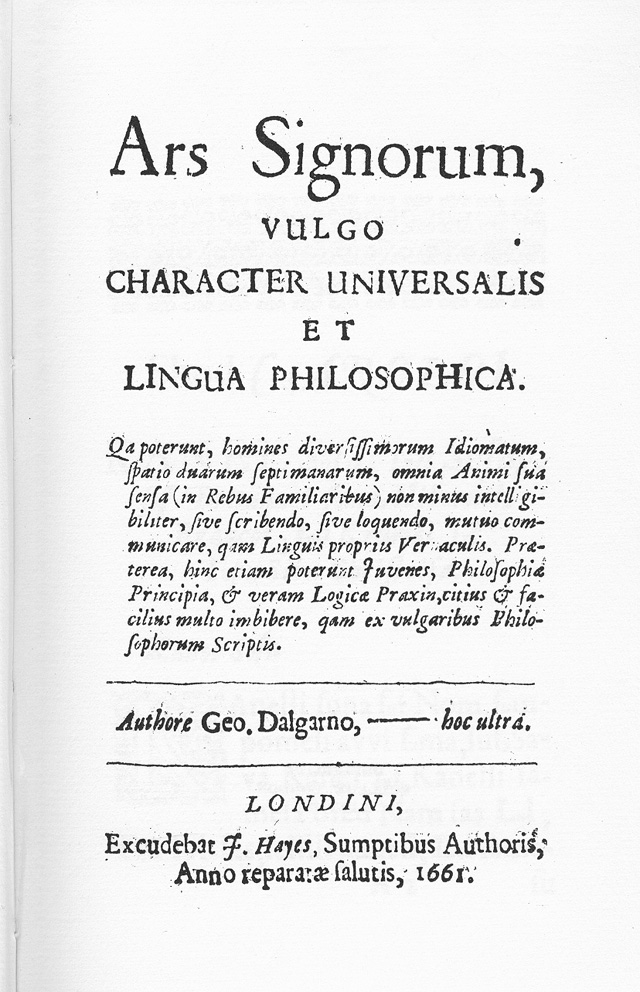George Dalgarno on:
[Wikipedia]
[Google]
[Amazon]
George Dalgarno (c. 1616 – 1687) was a
 Dalgarno was also interested in constructing what he called a '
Dalgarno was also interested in constructing what he called a '
Scottish
Scottish usually refers to something of, from, or related to Scotland, including:
*Scottish Gaelic, a Celtic Goidelic language of the Indo-European language family native to Scotland
*Scottish English
*Scottish national identity, the Scottish ide ...
intellectual interested in linguistic
Linguistics is the scientific study of language. The areas of linguistic analysis are syntax (rules governing the structure of sentences), semantics (meaning), Morphology (linguistics), morphology (structure of words), phonetics (speech sounds ...
problems. Originally from Aberdeen
Aberdeen ( ; ; ) is a port city in North East Scotland, and is the List of towns and cities in Scotland by population, third most populous Cities of Scotland, Scottish city. Historically, Aberdeen was within the historic county of Aberdeensh ...
, he later worked as a schoolteacher in Oxford
Oxford () is a City status in the United Kingdom, cathedral city and non-metropolitan district in Oxfordshire, England, of which it is the county town.
The city is home to the University of Oxford, the List of oldest universities in continuou ...
in collaboration with John Wilkins
John Wilkins (14 February 1614 – 19 November 1672) was an English Anglican ministry, Anglican clergyman, Natural philosophy, natural philosopher, and author, and was one of the founders of the Royal Society. He was Bishop of Chester from 1 ...
, although the two parted company intellectually in 1659.
Life
Dalgarno matriculated at Marischal College, Aberdeen, in 1631. Subsequently, he was a schoolteacher in Oxford in the 1650s. In 1657, he was encouraged to upgrade a system ofshorthand
Shorthand is an abbreviated symbolic writing method that increases speed and brevity of writing as compared to Cursive, longhand, a more common method of writing a language. The process of writing in shorthand is called stenography, from the Gr ...
on which he was working, by Samuel Hartlib
Samuel Hartlib or Hartlieb (c. 1600 – 10 March 1662)
M. Greengrass, "Hartlib, Samuel (c. 1600–1662)", ''Oxford D ...
, to a more ambitious universal system and he published on the subject later the same year. This effort brought him into contact with members of the M. Greengrass, "Hartlib, Samuel (c. 1600–1662)", ''Oxford D ...
Oxford Philosophical Club
The Oxford Philosophical Club, also referred to as the "Oxford Circle", was to a group of natural philosophers, mathematicians, physicians, virtuosi and dilettanti gathering around John Wilkins FRS (1614–1672) at Oxford University, Oxford in t ...
, one of the precursors of the Royal Society
The Royal Society, formally The Royal Society of London for Improving Natural Knowledge, is a learned society and the United Kingdom's national academy of sciences. The society fulfils a number of roles: promoting science and its benefits, re ...
.
Works
Dalgarno was the author of ''Didascalocophus or the Deaf and Dumb man's tutor'' (1680), which proposed a totally new linguistic system for use by deaf mutes. Dalgarno was also interested in constructing what he called a '
Dalgarno was also interested in constructing what he called a 'philosophical language
A philosophical language is any constructed language that is constructed from first principles, sometimes following a classification. It is considered a type of engineered language. Philosophical languages were popular in Early Modern times, partl ...
', now more usually referred to as universal language
Universal language may refer to a hypothetical or historical language spoken and understood by all or most of the world's people. In some contexts, it refers to a means of communication said to be understood by all humans. It may be the idea o ...
. A modern translation of his '' Ars signorum'' (''Art of Signs'', 1661) was published in 2001 in an edition that also includes his autobiography and other manuscript writings.
Notes
References
* David Cram and Jaap Maat, (eds.), ''George Dalgarno on Universal Language: The Art of Signs (1661), The Deaf and Dumb Man's Tutor (1680), and the Unpublished Papers'', Oxford: Oxford University Press, 2001. *Umberto Eco
Umberto Eco (5 January 1932 – 19 February 2016) was an Italian Medieval studies, medievalist, philosopher, Semiotics, semiotician, novelist, cultural critic, and political and social commentator. In English, he is best known for his popular ...
, ''The Search for the Perfect Language'', Fontana Press, 1997, , pp. 228–237
External links
* * 1610s births 1687 deaths Alumni of the University of Aberdeen Constructed language creators Linguists from Scotland 17th-century Scottish people Scottish scholars and academics Academics from Aberdeen Scottish schoolteachers 17th-century Scottish philosophers 17th-century Scottish autobiographers 17th-century Scottish writers 17th-century Scottish male writers {{Scotland-academic-bio-stub